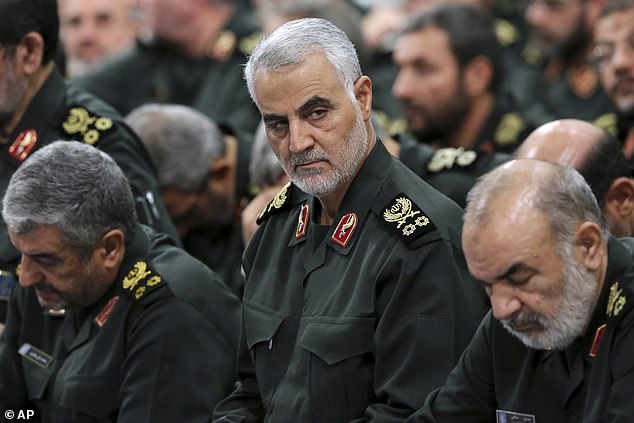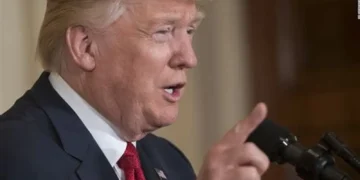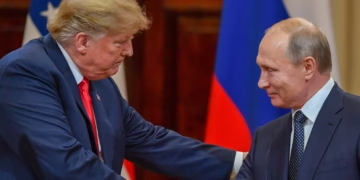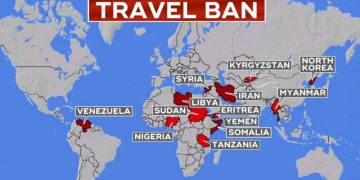Iran today issued Donald Trump with a second arrest warrant for the drone strike that killed top general Qasem Soleimani.
Trump along with 47 other US officials were the subject of an Interpol ‘red notice’ request for their involvement in the drone strike in Baghdad last year.
‘The Islamic Republic of Iran is very seriously following up on pursuing and punishing those who ordered and executed this crime,’ judiciary spokesman Gholamhossein Esmaili told reporters.
It is the latest provocation by Iran which brazenly announced it had resumed enriching uranium to weapons-grade levels yesterday as it seized a South Korean tanker in the Persian Gulf.
The aggression coincides with the first anniversary of the assassination of Soleimani, the architect of Iran’s foreign policy in the Middle East who saturated the battlefields of Iraq with high-tech IEDs to mutilate US soldiers.
Soleimani was slaughtered by a missile fired from a USAF MQ-9 Reaper aircraft along with Iraqi commander Abu Mahdi al-Muhandis as their motorcade pulled out of Baghdad airport.
The killing of the second-most powerful man in Iran came at the height of tensions in the region, with numerous assaults on US personnel and on the embassy in the Iraqi capital, as well as the shooting down of a US drone over the Persian Gulf and the impounding of oil tankers.
In June, a prosecutor in Tehran issued an arrest warrant for Trump and dozens of other Washington officials, saying that they were responsible for ‘murder and terrorism.’
Interpol, based in Lyon, France, rejected that request on the basis that it does not intervene in ‘activities of a political, military, religious or racial character .’
It will almost certainly dismiss Tehran’s latest effort on the same basis.
South Korea today demanded the release of the Hankuk Chemi oil tanker and its 20 crew who were captured on Monday near the Strait of Hormuz.
Iran said the ship was seized for ‘repeated infringement of maritime environmental laws’, but it comes amid Iranian demands for South Korea to release $7billion in assets that were frozen because of US sanctions.
The US last night called the seizure ‘part of a clear attempt to extort the international community’ and joined South Korea’s demand for the tanker to be released.
To add to the tensions, Iran said on Monday it had started the process to enrich uranium to 20 per cent purity, a short technical step away from making bombs.
Iran is hoping that Joe Biden will ease sanctions on Iran after he takes office on January 20, but there are fears that tensions could still boil over before then.
Vipin Narang, an expert on nuclear strategy at the Massachusetts Institute of Technology, warned that Donald Trump was sending signals of ‘total chaos’.
‘If I were Iran right now, I would actually be thinking that it’s possible that Trump is so unhinged and so angry about the election that he may overreact to any slight provocation,’ Narang said.
Trump had warned that he would hold Iran accountable for the killings of any Americans after the US embassy in Baghdad was hit by rockets a week ago.
But Sunday’s anniversary of the Soleimani drone strike passed without violence, despite angry demonstrations and Tehran’s calls for vengeance.
The seizure of the South Korean vessel came days before Seoul’s deputy foreign minister was due to visit the Islamic republic.
Iran’s Revolutionary Guards said the ship carrying 7,200 tonnes of chemical products was manned by a crew from South Korea, Indonesia, Vietnam and Myanmar.
The Guards did not specify where the tanker was seized but said it was transferred to Bandar Abbas port in Hormozgan with the ‘case handed to judicial authorities’.
Pictures released by the Guards appeared to show three speedboats and a patrol boat approaching the tanker.
Iranian foreign ministry spokesman Saeed Khatibzadeh claimed that the tanker’s seizure was over a ‘purely technical issue and due to polluting the sea’.
‘Just like other countries, Iran is sensitive towards such infractions, especially polluting the maritime environment,’ he said.
But the tanker’s operator DM Shipping denied that the vessel had polluted waters, South Korea’s Yonhap news agency reported.
Shortly before news of the ship’s seizure, Khatibzadeh had complained at a press conference about the ‘slow’ process of unfreezing funds from Iranian oil sales, blocked by Seoul over fears of violating US sanctions.
Trump re-imposed tough sanctions on Iran after abandoning the nuclear deal that Barack Obama had struck with Tehran and other world powers in 2015.
Last night the foreign ministry in Seoul said it had confirmed the safety of the crew and was now demanding that the vessel be released.
The country’s defence ministry said it had dispatched its anti-piracy Cheonghae unit to waters near the Strait of Hormuz.
In Washington, a State Department spokesperson called the seizure of the ship ‘part of a clear attempt to extort the international community into relieving the pressure of sanctions’.
‘We join the Republic of Korea’s call for Iran to immediately release the tanker,’ said the spokesperson.
The incident was the first seizure of a major vessel by the Iranian navy in more than a year.
In July 2019, the Guards seized the British-flagged oil tanker Stena Impero in the sensitive Strait of Hormuz for allegedly ramming a fishing boat and released it two months later.
It was widely seen as a tit-for-tat move after Gibraltar detained an Iranian tanker which was suspected of violating EU sanctions against Syria.
Tehran denied the two cases were related.
The Guards seized at least six other ships in 2019 over alleged fuel smuggling, while other tankers were hit by mysterious explosions that were blamed on Iran.
The US said it had found fragments of a limpet mine on one vessel attacked in the Gulf of Oman which were ‘strikingly’ similar to those seen in Iranian military parades.
Last week, sailors discovered a limpet mine stuck on a tanker off the coast of Iraq, near the Iranian border, as it prepared to transfer fuel to another vessel.
The incidents have raised fears over the safety of oil supplies in the Strait of Hormuz – a chokepoint through which a fifth of world oil output passes.
(Daily Mail)













